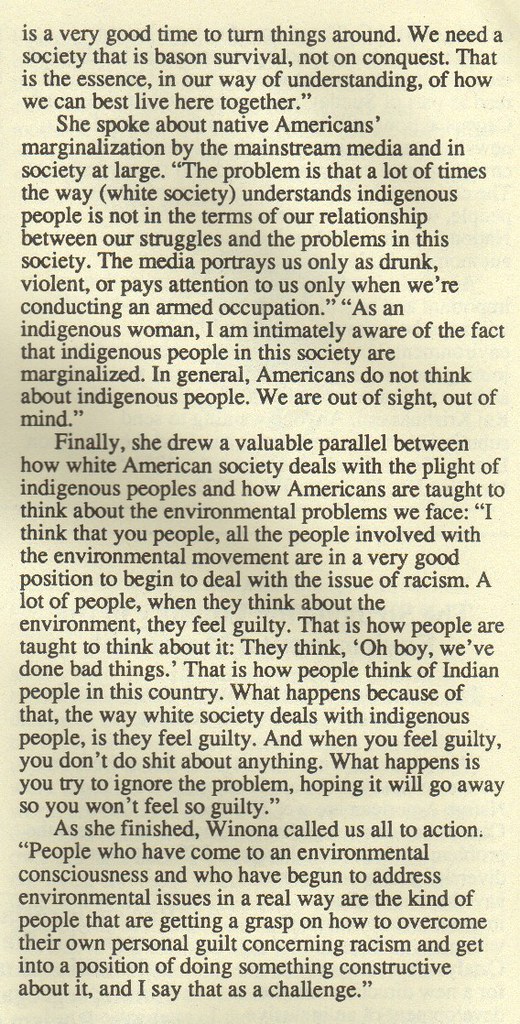"8,000 SEAC members from around the globe gather for Catalyst conference," Daily Tar Heel, 10/10/90
By MARY MOORE PARHAM, Staff Writer
They came from 50 states and 12 countries. Armed with little more than tents and the desire for environmental change, about 8,000 members of Student Environmental Action Coalition (SEAC) gathered at the University of Illinois last weekend for Catalyst, a three-day student convention with an agenda as varied as its participants. Panel discussions, benefit concerts and workshops were held at the Champaign-Urbana campus for Catalyst, the second annual national SEAC convention.
The first, Threshold, took place at UNC last year. This year's convention included a march and a rally as well as 5,000 more participants. Among those present were 49 students from UNC, the second largest group coming from outside of Illinois.
For SEAC co-chairman Alec Guettel, the convention was akin to being at a football game extended for an entire weekend. "All that energy was there, not for football, but for something a lot of these people have dedicated their lives to," he said. "It was totally inspiring." The UNC contingent made the 14-hour trip to Illinois by van, arriving Friday at the county fairgrounds where they set up camp.
At the time of the convention, only 2,700 students had registered. However, as SEAC members quickly realized, their numbers were much greater. "Because Catalyst was such a new concept, we had little to go on in terms of estimating the number of participants," said SEAC co-chairwoman Lisa Abbott. "But as we arrived, it was clear that we had about 4,000 people, and by Friday night, almost 8,000. It was phenomenal, absolutely phenomenal."
Indoor housing for SEAC members was limited, and most students chose to camp at the fairgrounds in tents or simply under the stars. A tent city emerged, complete with portable latrines and four showers per 3,000 people. Free mass transit was arranged to get students to and from the campus. At night, bonfires dotted the fairground, and spontaneous outbursts of guitar and drum playing filled the air, sophomore Ruby Sinreich said. SEAC members woke in the morning to small bands of students playing flutes and tambourines.
Catalyst was more than a small-scale Woodstock, however. The program opened with speeches by consumer and environmental advocate Ralph Nader, actor Robert Redford, the Rev. Jesse Jackson and Dr. Helen Caldicott, president emeritus of Physicians for Social Responsibility. Each addressed his or her personal concerns as they related to the focal topics of corporate environmental responsibility and environmental justice.
The first session targeted the oil industry and other corporations responsible for environmental transgressions caused by off-shore drilling or excessive product packaging. Freshman Stephanie Jayne explained the need to attack corporations directly to reach a lot of people. "Although attack may seem a strong word, I believe that when a corporation is targeted, it reaches more than just their executive board," she said. "Employees, stockholders, advertisers and the government will begin to take notice." In addition to corporate accountability is the need to conserve resources for future generations. "We're going to be giving this earth to someone else, and what people don't necessarily realize is that oil is a finite resource," Jayne said. "We can use it for only so many years and then it's gone."
Sunday's session on environmental justice dealt with the issue of minorities in the environmental movement. The movement has been criticized for lack of racial diversity. Students and speakers focused their attentions on diversity, not only of the movement's participants, but of its agenda as well. Part of this diversity came in the form of a new committee within SEAC called the People of Color Caucus, which will elect a representative to sit on the national SEAC board. "There was a lot of anger, and for a while, it looked really scary,” Guettel said. "But I believe that if the environmental movement alienates a minority, it is an immediate failure and will cease to grow."
Part of this growth is dependent on the actual definition of environmental-ism itself. Catalyst also addressed the issue of defining a term previously synonymous with rain forests and the ozone layer. "I think environmentalism is beyond trees and sky and is taking on a more universal sense," freshman Kirti Shastri said. "The environment is also about the people we live with and how we are all interrelated." Jayne said environmentalism needed to be treated as a social issue. "Especially if you consider that the majority of toxic waste dumps are in low-income, minority neighborhoods."
In addition to the two panel discussions, SEAC members planned a march and rally to culminate in the main quad of the campus. "We took up five blocks of street, and it really made you feel that we were large enough to effect change," Sinreich said. "To have so many people committed to making a difference was incredibly uplifting." Abbott agreed. "We would pass people on the side of the street and yell out for them to join us," she said. "The whole march was very symbolic of the movement. It was about reaching out to people, saying, 'Come join us, this is the direction we've got to head in.'" During the rally, foreign students spoke about their own involvement in environmentalism. In the forefront of discussion was the 1992 United Nations conference in Brazil, where many decisions will be made about the status of international environmental policy.
SEAC, in association with other student coalitions, is already planning two parallel youth conferences to take place worldwide. The first would be held two months before the Brazil date and would draw up a list of demands to be presented during the U.N. conference. The second would take place during the U.N. meeting. "If decisions aren't made here in 1992, they will never happen," Guettel said.
As Catalyst came to a close, the most often heard criticism of the meeting was its brevity. Smaller student discussion groups had to be cut out to make room for speakers and student workshops. What the convention lacked in time was compensated for by the empowerment for change brought home by its participants. "I left with an understanding that students are more ready than expected to take serious and definitive steps toward action," said UNC senior Ericka Kurz, national office coordinator. "There are a whole lot of people around the country ready to do something. They see the environment as more than just trees, but as people."
Students interested in joining SEAC should attend Thursday's meeting in room 217A of the Student Union at 5:15, or stop by the SEAC office in the Campus Y for more information.







